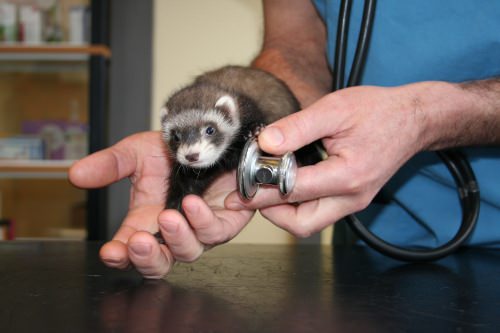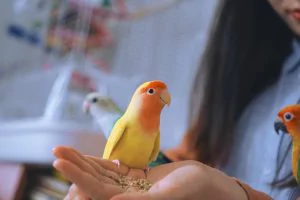Ferrets are active, cute and intelligent creatures. These animals are real firecrackers, constantly dashing around, exploring things, finding new games to entertain themselves with and constantly getting into trouble the way a naughty child would. To make sure that your ferret remains healthy and safe as it rips about through life, though, you need to know a few rules of ferret ownership.
1. Ferret-proof whatever rooms your ferret shouldn’t get into
Ferrets are naturally inquisitive animals that have the innate need to constantly explore their surroundings. Since they have small and very flexible bodies, they often manage to get into unexpected places. Ferrets are known to end up in washing machines, television cabinets, crawlspaces, air-conditioning vents, drawers, rain downspouts, drains and many other places where they could face the possibility of serious injury. Like rodents, ferrets feel the need to constantly chew on things, too. They can chew up doorstops, erasers and houseplants. These chewing habits can become life-threatening when intestinal blockages occur.
If you plan to get a ferret, you need to be very careful about ferret-proofing your home. You need to make sure that your ferret has nothing to chew on in the areas that it is allowed in and that it has absolutely no way into the rest of the house. It’s important never to underestimate how creative a ferret can get trying to find a way into an area of the house that it’s not allowed into.
2. Know what you should feed your ferret
Ferrets live on a purely carnivorous diet – their short digestive tracts have no ability to digest plant-based food. While ferrets can eat scraps of plant-based foods, large bites can cause intestinal blockages. Fruits and vegetables, for instance, can be life-threatening. To make sure that your ferret gets the nutrition it needs, you should discuss the proper diet required with a veterinarian.
More: 10 Ways Pets Improve Your Health
3. You must only get a ferret if you can spend time with it
While ferrets can entertain themselves by running around and exploring their surroundings, they can get bored once they feel that they’ve fully explored everything possible. Once your ferret has been in your home for a few days, you need to begin setting aside playtime to make sure that it doesn’t become restless with boredom. You don’t have to actually run around and play games, though – holding your ferret and petting it while you watch TV, like you would a cat, should be all that’s needed.
More: 10 Easy Ways to Save on Pet Costs
4. You need to observe your ferret’s habits and familiarize yourself with them
It’s important to know your ferret as well as possible. This is the only way you’ll be able to pick up on changes that indicate a health problem. If your ferret wakes up later than usual each morning or spends more time up at night than usual, you should be able to recognize that there’s a problem.
More: 8 Ways to Organize Your Pet
5. Be sure to give your ferret the right temperature and humidity levels
Ferrets are unable to take high temperatures – they aren’t built to lose heat through sweating. Winters can also be dangerous, when the humidity is high. If the heat outside goes above 90°F, you need to make sure to put your ferret in an air-conditioned room indoors. If you don’t have air conditioning, you need to somehow create a cool area for your ferret – say, by putting its cage in the basement.
More: 10 Plants to Keep Away from Pets
6. Train your ferret to come running when you whistle
In the event of an emergency, for instance an earthquake or fire, you want to be able to collect your ferret before you run out. Ferrets are small creatures that can hide out in a bewildering range of places. They can be impossible to find. It’s important to train your ferret to come to you on command.
More: 10 Helpful Tips for Finding a Lost Pet
7. Give your ferret the darkness it needs
Pet ferrets do best when the indoors environment that you give them mimics the natural one outdoors. At the very least, your ferret should have a place where it can go for the cover of darkness, should it feel like it.
More: 9 Amazing Benefits of Owning a Ferret
8. Make regular visits to the vet
Ferrets need as much veterinary care as dogs, cats and other regular pets do. Unfortunately, not many veterinarians are knowledgeable in ferret medicine. You need to do your research and find such vets. When you find the professional vet, make sure you visit them regularly.
More: 10 Tips for Choosing a Vet for Your Pet
9. Begin to build a savings account for unexpected needs
Ferrets don’t usually need much since they are simple pets to care for. Nevertheless, they do have needs from time to time – toys, a cage or even special medical care. Ferrets are prone to diseases of the adrenaline gland and the pancreas. I suggest you to start a savings account so that you always have money for your pet.
More: 10 Most Unique Pets You Can Own
10. Keep learning
Since ferrets are exotic pets, you won’t find as much information from the resources around you to help you raise them well. You need to be proactive and keep hunting for information. The better informed you are, the healthier you will be able to raise your ferret. Never stop learning about your ferret, it’s always useful to know something new about your pet.
There are many benefits of owning ferrets. They are cute, friendly and they make great pets for people who have the time for them. Do you own a ferret? Do you have any other tips to share?


















Comments